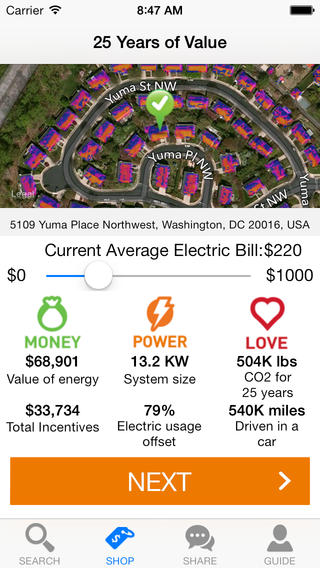OK people, let’s get earthy. Let me ask you, what’s your Solar Mojo?
Heh? No clue what the Panda means?
Well that’s the question being asked and answered by a relative startup in the solar power space — Geostellar — for homeowners across the country with its introduction this week of the new online Solar Mojo marketplace at Geostellar.com and mobile app.
Much like Orbitz or Kayak does in the travel space, the entire package will for the first time allow U.S. consumers to compare solar installation and financing plans from industry leaders and then go solar with the push of a button.
 “We’re bringing the online comparison shopping experience to solar energy,” said David Levine, CEO of Geostellar, who was once the lead singer of popular ’80s band Senator Flux. “Every U.S. homeowner now has immediate access to real-time, free and independent assessments of the costs and benefits of cash, loan and lease solar energy plans.”
“We’re bringing the online comparison shopping experience to solar energy,” said David Levine, CEO of Geostellar, who was once the lead singer of popular ’80s band Senator Flux. “Every U.S. homeowner now has immediate access to real-time, free and independent assessments of the costs and benefits of cash, loan and lease solar energy plans.”
Developed by Geostellar with a supply chain supported by NRG Residential Solar Solutions, SolarCity, Admirals Bank, Roof Diagnostics Solar, Southern Energy Management and other leading solar finance and installation companies, Solar Mojo taps the inventory of the nation’s largest solar equipment distributors, fits the solar panels to individual rooftops, models the energy production, environmental and economic benefits of solar energy, presents qualified solar installers, and compares financing options to best meet the needs of the homeowner — making it easier than ever for homeowners to go solar and share solar.
The who kibosh is pretty simple for consumers. Users enter an address and the average cost of their monthly electricity bills, then Geostellar’s advanced “Big Data Geomatics” technology does the rest:
– Quantifies the ability of each home to generate solar energy and benefit from its production by moving a virtual sun through the sky of a 3D landscape over the course of the year and computing the site-specific solar energy value based on the home’s solar energy signature, which includes the unique energy production potential of the rooftop shading, slope and orientation, the optimal size of the solar energy system, utility rates, electricity usage patterns, and the application of incentives.
– Determines carbon offset through a feedstock analysis of the energy mix on the local conventional electric grid.
– Compares the solar energy plans available in each market such as 1) leased solar plans in which the solar panels are installed, owned, monitored and maintained by the solar energy provider and the homeowner pays a monthly fee, 2) lending plans where the bank pays for the installation and the loan is paid off through government incentives and electricity bill offset and 3) cash purchase plans for homeowners who have capital to invest in the solar energy installation and want to receive the direct benefit of national and local tax credits, rebates and performance-based incentives.
– Notifies Solar Guides – experienced and certified solar energy professionals available through instant messaging, on the phone or by email – who are dispatched to help homeowners select a plan, qualify for financing and determine their eligibility for government incentives.
In a pill, Geostellar’s new Solar Mojo presents a clear comparison of the benefits and costs of solar leases, bank loans and cash purchases for each individual homeowner, based on their specific homes and unique needs. Homeowners can view the details of each solar energy plan, including up-front costs, ongoing payments, incentives and savings on electricity bills, so they can make informed decisions. And because every home has a different solar energy signature as determined by the slope, shading and orientation of each roof facet as well as economic and energy usage factors, only Geostellar can present an instant, accurate comparison of solar plans for individual homes.
According to a recent report from the Center for American Progress, since 2000, more than 1,460 megawatts of residential solar installations are producing power in the United States, and these installations are overwhelmingly occurring in middle-class neighborhoods that have median incomes ranging from $40,000 to $90,000.
Geostellar has, in essence, accomplished what the big solar players have not — providing the first simple, integrated affiliate program to drive the adoption of solar energy across the country. And it just may change the way homeowners look at the sun.
Not bad for a startup, heh?









